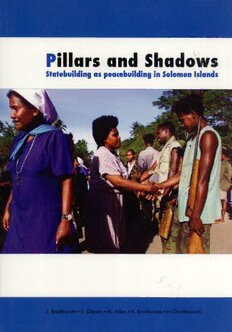
Pillars and Shadows: Statebuilding as peacebuilding in Solomon Islands PDF
212 Pages·2010·8.631 MB·English
Most books are stored in the elastic cloud where traffic is expensive. For this reason, we have a limit on daily download.
Preview Pillars and Shadows: Statebuilding as peacebuilding in Solomon Islands
Description:
This volume of the Peacebuilding Compared Project examines the sources of the armed conflict and coup in the Solomon Islands before and after the turn of the millennium. The Regional Assistance Mission to Solomon Islands (RAMSI) has been an intensive peacekeeping operation, concentrating on building 'core pillars' of the modern state. It did not take adequate notice of a variety of shadow sources of power in the Solomon Islands, for example logging and business interests, that continue to undermine the state's democratic foundations. At first RAMSI's statebuilding was neither very responsive to local voices nor to root causes of the conflict, but it slowly changed tack to a more responsive form of peacebuilding. The craft of peace as learned in the Solomon Islands is about enabling spaces for dialogue that define where the mission should pull back to allow local actors to expand the horizons of their peacebuilding ambition.
See more
The list of books you might like
Most books are stored in the elastic cloud where traffic is expensive. For this reason, we have a limit on daily download.
